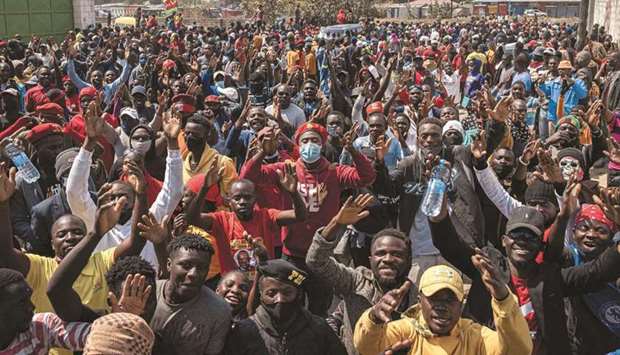Zambian President Edgar Lungu has declared Thursday’s presidential and parliamentary election as “not free and fair” after incidents of violence in three provinces, he said in a surprise statement released yesterday.
Lungu, who was trailing his main contender Hakainde Hichilema in early results from the electoral commission, said the Patriotic Front party that he leads is consulting on its next course of action.
“President Lungu says the general election in three provinces, namely, Southern province, North Western province, and Western Province, were characterised by violence, rendering the whole exercise a nullity,” the statement from his office said.
He said that Patriotic Front polling agents were brutalised and chased from polling stations, a “situation that left the ruling party’s votes unprotected” in those three provinces.
Citing the killing of a party chairman in North Western province during voting and the death of another man, Lungu said these criminal acts rendered the general election “not free and fair”.
Lungu brought in army reinforcements to help quell violence when the deaths occurred.
Lungu, 64, has been in power since 2015.
Hichilema – known as “HH” – is a businessman who has criticised the president’s management of an economy in turmoil.
This is the third time Hichilema has challenged Lungu in what analysts said would be a closely-fought election amid growing resentment about rising living costs and crackdowns on dissent in the southern African country.
Investors are closely watching the outcome of the election, which was held on Thursday.
The southern African country is highly-indebted and suffered the continent’s first coronavirus (Covid-19) pandemic-era sovereign default in November.
International Monetary Fund (IMF) support, already broadly agreed, is on hold until after the vote.
Results from 31 of the country’s 156 constituencies gave Hichilema 449,699 votes versus the 266,202 garnered by Lungu, who is running for a second five-year term.
Some constituencies include perceived Lungu strongholds, suggesting that Hichilema has gained ground since the last elections in 2016, when he lost by a slim margin in elections marred by allegations of rigging.
The first results had initially been expected on Friday.
They were delayed after counting went on overnight following a heavy turnout and because political parties objected to the electoral commission’s initial figures in one constituency, which differed with those from monitors on the ground.
An estimated 7mn people registered to vote in the presidential and parliamentary elections in Zambia, Africa’s second biggest copper producer.
The Electoral Commission of Zambia allowed the last polling station to remain open until 5am on Friday, to give people who had queued for hours an opportunity to vote.
The election also saw violence in three regions and restrictions on Internet access.
In Chawama township in Lusaka, Lungu’s parliamentary constituency before he became president, residents said supporters of both Lungu and Hichilema both claimed victory and celebrated throughout the night.
Lungu’s ruling Patriotic Front party said its vote tally showed a huge turnout in its strongholds and it was confident of victory.
Hichilema is running for the United Party for National Development (UPND).
Following a complaint lodged by local human rights’ organisation, Chapter One Foundation, a high court on Friday overturned a decision by the government regulator to block social media platforms including WhatsApp, Facebook and Instagram.
Linda Kasonde, the Foundation’s executive director, said it is unclear how long the social media Internet blackout would remain in force.
Some people said yesterday that their online services were back up.
“It did go up. Some people reported that WhatsApp went down, but they had access to Facebook and Twitter,” she said.
According to the court ruling seen by Reuters, the Zambia Information Communication Technology Authority ordered the block on Thursday, the day of the election.
Richard Mulonga, chief executive of Bloggers of Zambia, an independent group, said it is unclear whether the national regulator had implemented the order and that it could take “a week or even months” for services to stabilise.
Lungu has cast doubt on the outcome of the election in three provinces after accusing the opposition of stirring violence on Thursday that killed an official from the ruling party.
He directed the army to send reinforcements to the provinces on Thursday.
However, European and African observers said the vote had been largely peaceful.
The head of the African Union (AU)’s observer mission, Ernest Bai Koroma, said yesterday that voting “operations were conducted in a peaceful, transparent and professional manner”.
European Union counterparts were slightly more critical of the poll, denouncing the Internet restrictions and “unequal campaign conditions”.
The electoral process was “technically well-managed” but “marred by ... restrictions on freedoms of assembly and movement, and abuse of incumbency”, chief observer Maria Arena told a press briefing.
Hundreds of UPND supporters marched through the capital Lusaka yesterday, voicing impatience at the ECZ.
Soldiers deployed to police Thursday’s vote following violent pre-election clashes monitored the scene from armoured military vehicles.

Supporters for Zambia’s presidential candidate for the opposition party United Party for National Development (UPND), Hakainde Hichilema, gather yesterday outside one of the party offices, where they are demanding the release of the full set of electoral results in Lusaka.
